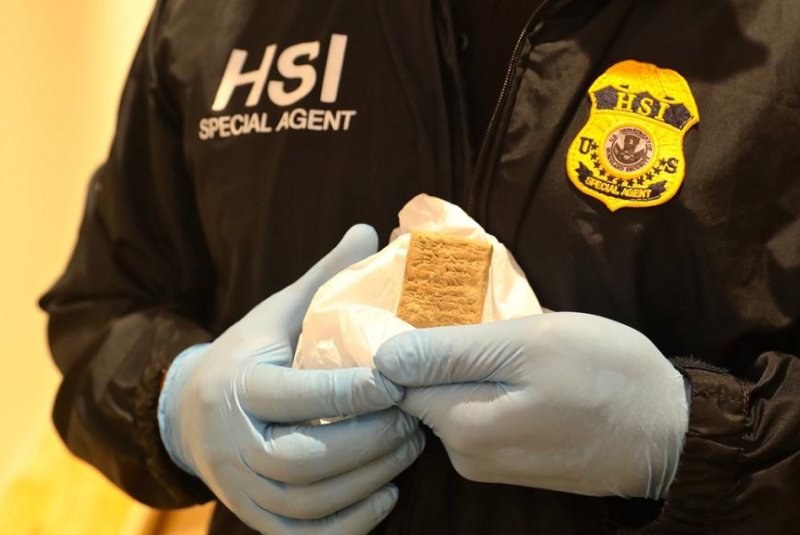Hobby Lobby illegally smuggled 3,800 cuneiform tablets, cylinder seals and clay bullae from Iraq, items that U.S. customs officials returned to the Middle Eastern country Wednesday. File Photo courtesy of Immigration and Customs Enforcement
May 2 (UPI) -- Customs officials on Wednesday returned thousands of artifacts illegally smuggled out of Iraq by arts and crafts chain Hobby Lobby, the U.S. Immigration and Customs Enforcement said.
The agency sent back 3,800 items, including cuneiform tablets, cylinder seals and clay bullae, much of which originated from the ancient city of Irisagrig. Some of the tablets date back to 2100 B.C., while the bullae are from between the 2nd century B.C. to the early 7th century A.D.
"These pieces are very important to us and they should be returned home to Iraq, to the rightful owner of these pieces," Iraqi Ambassador to the United States Fareed Yasseen said.
In July 2017, Hobby Lobby agreed to pay $3 million and return the artifacts after they were improperly brought into the United States. Steve Green, president of Hobby Lobby and a member of the family that owns the company, paid $1.6 million for 5,500 ancient artifacts in Dubai.
The Department of Justice found the company had the tablets shipped to its Oklahoma headquarters, but that the boxes were labeled as containing ceramic tile samples. The items also were split up into shipments to multiple addresses so as not to raise the suspicions of customs agents, ICE said.
Green promised more oversight at the time, and blamed the incident on his own inexperience as a collector.
"We made mistakes, but we've learned from them," he said.
"Before this, we weren't collectors or museum-goers," Green added. "We didn't know we needed to ask for all this paperwork" to prove provenance.
"The Republic of Iraq, standing on the land that was once home to the storied city-states and kingdoms of Mesopotamia, has a celebrated heritage as a cradle of civilization," U.S. Attorney Richard P. Donoghue said. "We are proud to have played a role in removing these pieces of Iraq's history from the black market of illegally obtained antiquities and restoring them to the Iraqi people."
Green's misstep has cast a shadow over the recent opening of his family's Museum of the Bible in Washington, D.C. The $500 million facility, funded in large part by the Greens, opened in November.
Some of the exhibits were donated by Green, whose family has collected about 40,000 artifacts worth more than $205 million over the past eight years. Observers noted that the museum may be trying to distance itself from the family after their collecting practices came under scrutiny with the tablets and bullae returned to Iraq on Wednesday.
File Photo by Kevin Dietsch/UPI
Proving prior ownership of an artwork or artifact is meant not only to verify the authenticity of the piece, but to prevent the sale of looted items.
Josephine Dru was the former curator of the Greens' collection of papyri; she left after three years over concerns about how the museum handled the provenance of some manuscripts.
"The Greens are good people, and they wanted to find important artifacts to study, but the situation may end up hurting some of the scholars and students they wanted to help," she said at the time of the museum's debut.
Museum Director David Trobisch said the museum has rejected some donations made by the family over questions of prior ownership and said most of the Greens' collection remains with the family. The museum will have 2,840 vetted artifacts in its permanent collection.
The museum's board has hired a cultural heritage lawyer to authenticate all items in the collection.
















